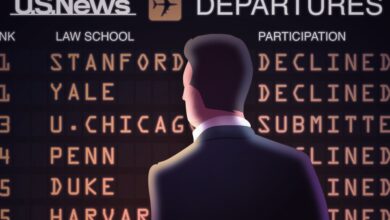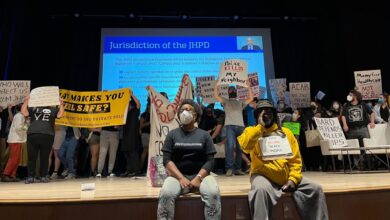‘Gainful Employment’ Rule Is Back on the Table, as Biden Administration Takes Aim at For-Profit Colleges
[ad_1]
The Education Department on Monday evening released details of its proposed “gainful employment” rule — a measure that seeks to hold some colleges accountable for the earnings of their graduates.
If it takes effect — at the earliest, in July 2023 — the regulation would compare students’ earnings after graduation to their student-loan debts. Programs whose graduates earn too little over a three-year period could lose access to federal student aid. The penalties would apply only to programs at for-profit colleges as well as nondegree programs at public or private nonprofit colleges.
A similar regulation was introduced in 2011 under the Obama administration and was later dismantled under President Donald J. Trump. But department officials in the Biden administration say the gainful-employment regulation is a key part of their higher-education agenda.
The department is introducing the proposed regulation during negotiated rulemaking, a process that allows a committee to debate the measure and recommend changes. The negotiators — department officials, policy advocates, and others — are also considering a host of other measures to hold proprietary and career programs accountable, including revisions in the “90/10” rule, which requires for-profit colleges to receive no more than 90 percent of their revenue from federal student loans or Pell Grants.
The first gainful–employment rule was put in place in 2015 under President Barack Obama, following two court battles and some revisions. Its impact would have been significant, had it survived longer. By the department’s January 2017 estimates, more than 800 programs that enrolled hundreds of thousands of students would not have met the gainful-employment standards. For-profit colleges offered 40 percent of the programs subject to the rule, and nearly all of them would have failed to meet its standards, according to a white paper by the Institute for College Access and Success.
But the rule was never fully enforced. Trump’s education secretary, Betsy DeVos, scuttled the regulation as one of several measures to ease oversight of for-profit colleges during her tenure.
The higher-education market, however, is now far different than what it was a decade ago. Major players in the for-profit sector, Corinthian and ITT, closed near the end of the Obama administration. A controversial accreditor of for-profit colleges, once among the largest in the nation, was nearly shut down by Obama’s Education Department. DeVos gave the accreditor a second chance, but it had already lost most of its members.
By 2019, enrollment at for-profit colleges was about half of what it was in 2010, according to federal data, and made up just 5 percent of students in higher education. There has been a small uptick in their numbers during the pandemic.
To some extent, the department’s latest regulatory proposals, which are not yet published online, reflect the changing higher-education landscape as well as calls to broaden accountability to more public and private nonprofit colleges. Under the new proposal, all institutions would have to report how their programs fare in comparisons of students’ earnings with their debts, though the penalties would apply only to career programs and those offered at for-profit colleges. Such information could be required to be disclosed to prospective students during the application process, department officials said.
The proposal to change the “90/10″ rule would require for-profit colleges to include tuition they receive under the GI Bill, and other federal student-aid sources outside Title IV, in calculating their 90-percent cap on federal dollars. That would close a loophole that for-profit colleges, by targeting veterans as students, have used to stay within the bounds of the rule, critics have said.
The department is also proposing to tighten the rules for institutions that undergo a change in ownership, by requiring that when a for-profit college seeks to become a nonprofit one, its former owner cannot continue to hold a financial stake in it. Such a rule would prevent what some have called sham conversions to nonprofit status, which allow the owners to continue to profit while avoiding the extra accountability that is applied to proprietary colleges.
[ad_2]
Source link






